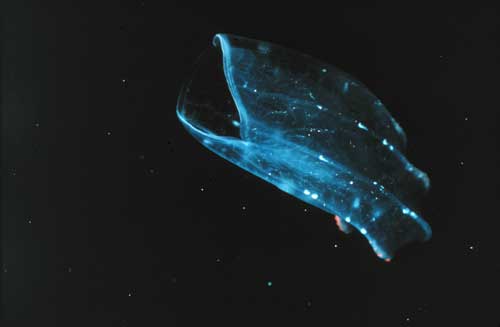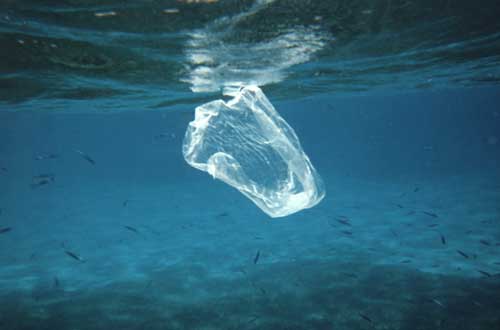Hold the Styrofoam cup; I'll take my scalding hot coffee in a single-use plastic bag to go!
Sounds ridiculous -- and it is -- yet that is the frivolous nature of the argument attorney Stephen Joseph and his San Francisco-based Save the Plastic Bag Coalition resort to in their latest legal challenge.
The New Year began with news reports that Santa Cruz County might reconsider a key provision of its precedent setting single-use plastic bag ban as early as its next Board meeting in January, in order to make a frivolous lawsuit go away.
A San Francisco news station quoted attorney Joseph saying:
There is a safety issue; if you have hot liquids, hot grease, hot oil and foods and it spills, it goes right though a paper bag . . . People have been injured because of that kind of thing.
Set against the magnificent blue shoreline of the Monterey Bay National Marine Sanctuary, Santa Cruz County has always been a trusted steward when it comes to protecting marine life and the fragile ecosystems of the Monterey Bay. That includes keeping single-use plastic bags off Sanctuary shores and out of Sanctuary waters.
Single-use plastic bags present a suffocation risk to marine animals just like humans:
Otter mom desperately tries to remove plastic bag from her pup's head - she was eventually successful. Photo Credit: Terry McCormac www.terrymccormac.com © Terry N. McCormac
Sea turtles eat jellyfish for food:
Species: Ctenophore or comb jellyfish. Photo Credit: NOAA - OAR/National Undersea Research Program (NURP)
But sometimes mistake plastic bags for jellyfish -- an often deadly mistake:
Species: Single-Use Plastic Bag. Photo Credit: NOAA
What happens next in Santa Cruz County will have far reaching consequences for the State of California and for our country as well. After all, we are talking about protecting the nation's largest marine sanctuary from single-use plastic proliferation and pollution.
The Santa Cruz County ban is arguably the toughest and most comprehensive in the nation, taking the revolution against single-use plastic bags one step further than those previously enacted.
A culmination of over two years of legislative crafting by Supervisor Mark Stone and passionate advocacy by Laura Kasa and Save Our Shores, the ban is both bold and progressive because it also applies to restaurants -- something the Save the Plastic Bag Coalition apparently can't stomach.
The lawsuit is political extortion, plain and simple: drop the restaurant provision in the ban or risk incurring huge legal costs that divert scarce tax dollars away from much needed public safety and community services.
They said if we pull that restaurant piece out of our ordinance, they would drop their lawsuit. (Supervisor Mark Stone)
Scare tactics warning of e-coli and bacteria contamination in reusable bags -- once the plastic industries preferred argument -- are no longer persuasive.
Myths and misstatements about the environmental virtues of single-use plastic bags are being questioned by society in every quarter of the globe; and just as quickly being dismissed, thanks to education and outreach by organizations like the Plastic Pollution Coalition and excellent commentary by individuals like Stiv J. Wilson of 5Gyres.org.
Now attorney Joseph and his coalition claim that single-use plastic bags are a "safety issue" for restaurant customers.
In the complaint he filed in Santa Cruz County Superior Court, attorney Joseph specifically referenced the infamous 1994 McDonald's hot coffee case, and he attached photographs depicting ghastly third-degree burns suffered by 79-year-old Stella Liedbeck, as exhibits.
The McDonald's hot coffee case had nothing to do with plastic bags. It was all about the flesh-burning, 190-degree temperature of the coffee that was not fit for consumption.
For attorney Joseph and his coalition to infer in their lawsuit that a flimsy, thin, single-use plastic bag would have prevented the McDonald's coffee accident -- without any facts or evidence to support the claim -- is just dishonest.
In fact, the whole point of the McDonald's coffee case was that restaurants should not be serving food or hot beverages at temperatures that are not fit for human consumption.
This is not a safety issue as attorney Joseph and his coalition would have us believe.
It's corporate bullying by the plastic industry to make cities and counties think twice before passing environmental laws that cut into their profits, laws that are supported by the majority of residents who prefer to live in clean communities, free of harmful and wasteful single-use plastics.
We may never know why attorney Joseph felt compelled to exploit Stella Liedbeck's horrific injuries to further his coalition's cause.
Perhaps the plastic industry figures if our society is taken back, turns away or covers its eyes, and cringes with a heavy heart at the sight of a mother otter desperately trying to remove a plastic bag from around the head of her infant -- just as any human mother would -- then it is somehow OK to include the pictures of 79-year-old Stella Liedbeck's third-degree burns to elicit the same type of emotional response to Santa Cruz County's plastic bag ban.
Exploiting Stella Liedbeck's human suffering to advance the plastic industry's agenda, however, speaks volumes about the veracity and substance of the argument being made. And attorney Joseph's decision to use the images in this context deserves nothing but our disdain as a society that understands right from wrong, and knows better.
If the Santa Cruz County Board of Supervisors decides to modify the plastic bag ban, it should be with an amendment that will ensure citizens who voluntarily chose to forgo single-use plastic bags in favor of bringing their own reusable ones will not be denied the right to do so at a restaurant.
(The author is a public member of Save Our Shores and has made financial contributions to the organization.The views and opinions expressed in this article are soely those of the author, and should not be interpreted as representing the views, policies or opinions of Save Our Shores.)
